Development of Young Children
VerifiedAdded on 2022/09/15
|7
|1668
|16
AI Summary
Contribute Materials
Your contribution can guide someone’s learning journey. Share your
documents today.
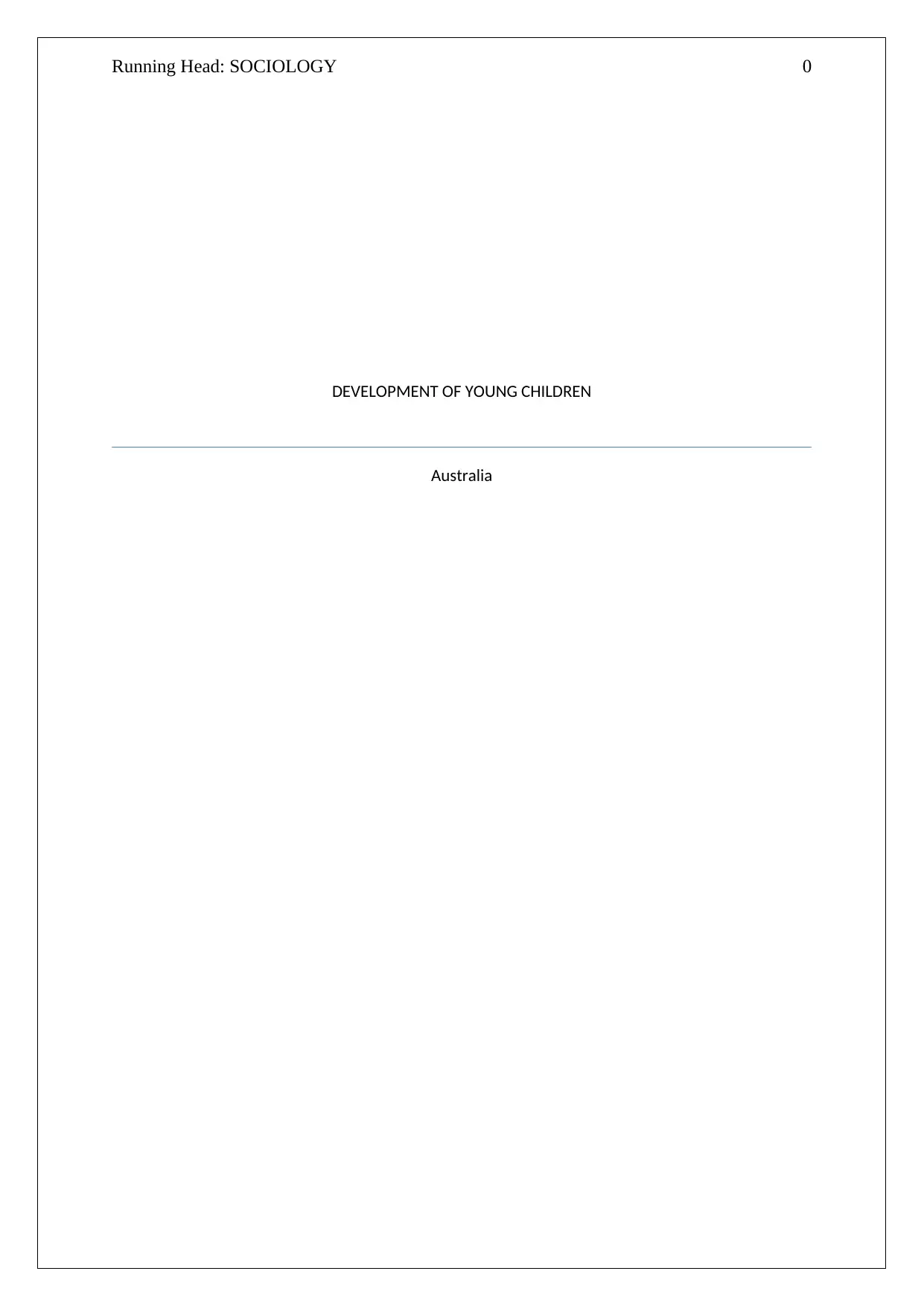
Running Head: SOCIOLOGY 0
DEVELOPMENT OF YOUNG CHILDREN
Australia
DEVELOPMENT OF YOUNG CHILDREN
Australia
Secure Best Marks with AI Grader
Need help grading? Try our AI Grader for instant feedback on your assignments.
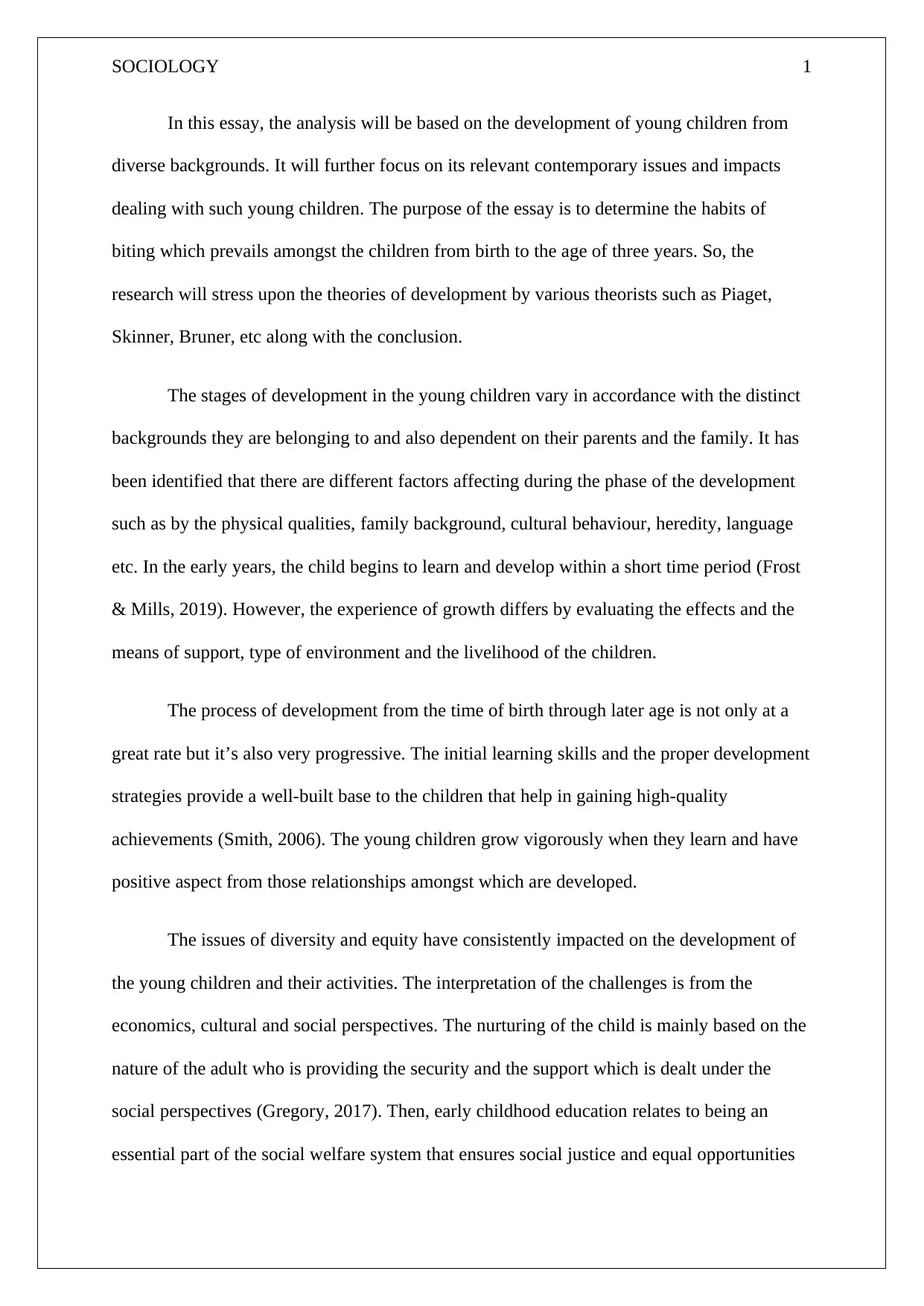
SOCIOLOGY 1
In this essay, the analysis will be based on the development of young children from
diverse backgrounds. It will further focus on its relevant contemporary issues and impacts
dealing with such young children. The purpose of the essay is to determine the habits of
biting which prevails amongst the children from birth to the age of three years. So, the
research will stress upon the theories of development by various theorists such as Piaget,
Skinner, Bruner, etc along with the conclusion.
The stages of development in the young children vary in accordance with the distinct
backgrounds they are belonging to and also dependent on their parents and the family. It has
been identified that there are different factors affecting during the phase of the development
such as by the physical qualities, family background, cultural behaviour, heredity, language
etc. In the early years, the child begins to learn and develop within a short time period (Frost
& Mills, 2019). However, the experience of growth differs by evaluating the effects and the
means of support, type of environment and the livelihood of the children.
The process of development from the time of birth through later age is not only at a
great rate but it’s also very progressive. The initial learning skills and the proper development
strategies provide a well-built base to the children that help in gaining high-quality
achievements (Smith, 2006). The young children grow vigorously when they learn and have
positive aspect from those relationships amongst which are developed.
The issues of diversity and equity have consistently impacted on the development of
the young children and their activities. The interpretation of the challenges is from the
economics, cultural and social perspectives. The nurturing of the child is mainly based on the
nature of the adult who is providing the security and the support which is dealt under the
social perspectives (Gregory, 2017). Then, early childhood education relates to being an
essential part of the social welfare system that ensures social justice and equal opportunities
In this essay, the analysis will be based on the development of young children from
diverse backgrounds. It will further focus on its relevant contemporary issues and impacts
dealing with such young children. The purpose of the essay is to determine the habits of
biting which prevails amongst the children from birth to the age of three years. So, the
research will stress upon the theories of development by various theorists such as Piaget,
Skinner, Bruner, etc along with the conclusion.
The stages of development in the young children vary in accordance with the distinct
backgrounds they are belonging to and also dependent on their parents and the family. It has
been identified that there are different factors affecting during the phase of the development
such as by the physical qualities, family background, cultural behaviour, heredity, language
etc. In the early years, the child begins to learn and develop within a short time period (Frost
& Mills, 2019). However, the experience of growth differs by evaluating the effects and the
means of support, type of environment and the livelihood of the children.
The process of development from the time of birth through later age is not only at a
great rate but it’s also very progressive. The initial learning skills and the proper development
strategies provide a well-built base to the children that help in gaining high-quality
achievements (Smith, 2006). The young children grow vigorously when they learn and have
positive aspect from those relationships amongst which are developed.
The issues of diversity and equity have consistently impacted on the development of
the young children and their activities. The interpretation of the challenges is from the
economics, cultural and social perspectives. The nurturing of the child is mainly based on the
nature of the adult who is providing the security and the support which is dealt under the
social perspectives (Gregory, 2017). Then, early childhood education relates to being an
essential part of the social welfare system that ensures social justice and equal opportunities
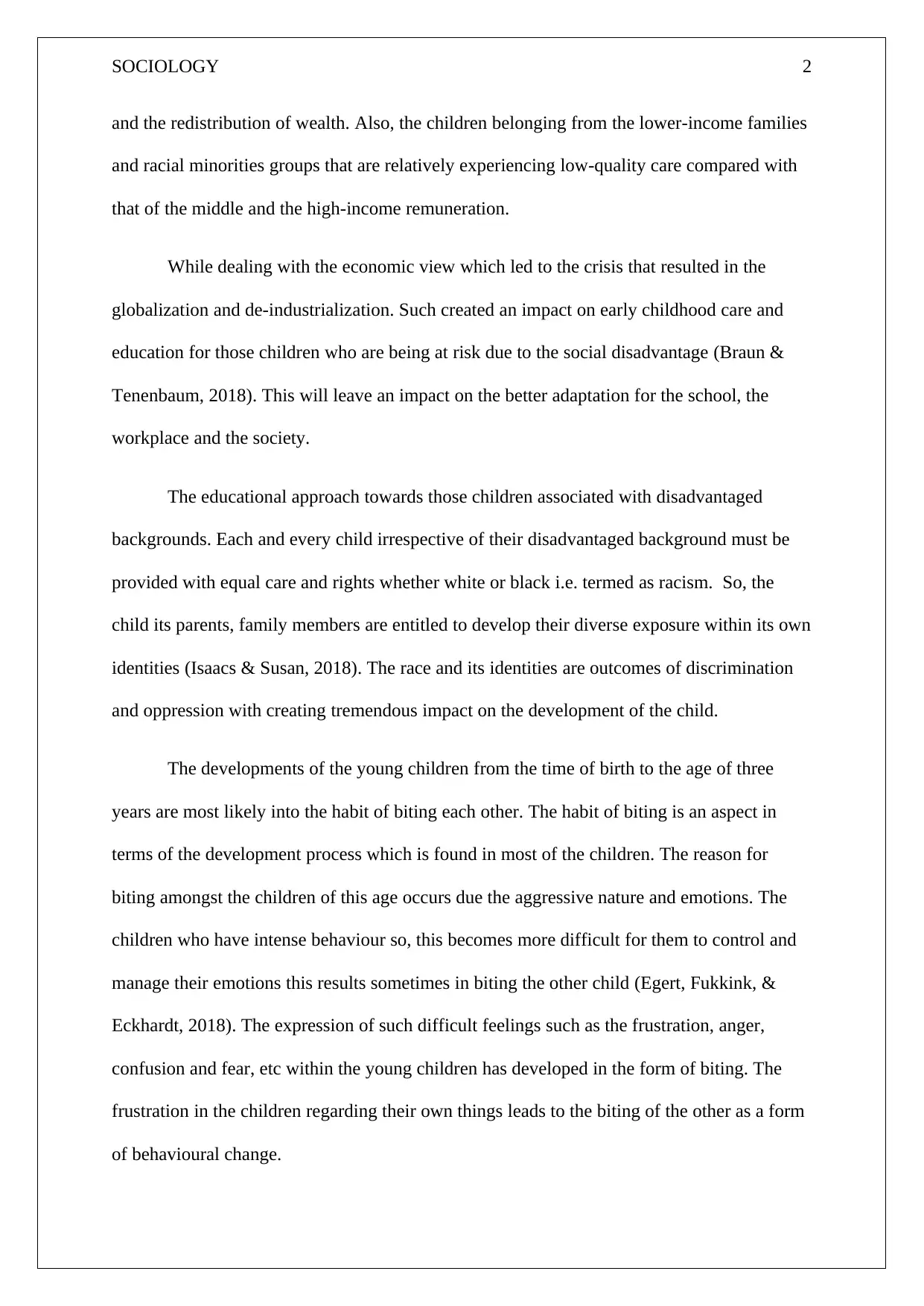
SOCIOLOGY 2
and the redistribution of wealth. Also, the children belonging from the lower-income families
and racial minorities groups that are relatively experiencing low-quality care compared with
that of the middle and the high-income remuneration.
While dealing with the economic view which led to the crisis that resulted in the
globalization and de-industrialization. Such created an impact on early childhood care and
education for those children who are being at risk due to the social disadvantage (Braun &
Tenenbaum, 2018). This will leave an impact on the better adaptation for the school, the
workplace and the society.
The educational approach towards those children associated with disadvantaged
backgrounds. Each and every child irrespective of their disadvantaged background must be
provided with equal care and rights whether white or black i.e. termed as racism. So, the
child its parents, family members are entitled to develop their diverse exposure within its own
identities (Isaacs & Susan, 2018). The race and its identities are outcomes of discrimination
and oppression with creating tremendous impact on the development of the child.
The developments of the young children from the time of birth to the age of three
years are most likely into the habit of biting each other. The habit of biting is an aspect in
terms of the development process which is found in most of the children. The reason for
biting amongst the children of this age occurs due the aggressive nature and emotions. The
children who have intense behaviour so, this becomes more difficult for them to control and
manage their emotions this results sometimes in biting the other child (Egert, Fukkink, &
Eckhardt, 2018). The expression of such difficult feelings such as the frustration, anger,
confusion and fear, etc within the young children has developed in the form of biting. The
frustration in the children regarding their own things leads to the biting of the other as a form
of behavioural change.
and the redistribution of wealth. Also, the children belonging from the lower-income families
and racial minorities groups that are relatively experiencing low-quality care compared with
that of the middle and the high-income remuneration.
While dealing with the economic view which led to the crisis that resulted in the
globalization and de-industrialization. Such created an impact on early childhood care and
education for those children who are being at risk due to the social disadvantage (Braun &
Tenenbaum, 2018). This will leave an impact on the better adaptation for the school, the
workplace and the society.
The educational approach towards those children associated with disadvantaged
backgrounds. Each and every child irrespective of their disadvantaged background must be
provided with equal care and rights whether white or black i.e. termed as racism. So, the
child its parents, family members are entitled to develop their diverse exposure within its own
identities (Isaacs & Susan, 2018). The race and its identities are outcomes of discrimination
and oppression with creating tremendous impact on the development of the child.
The developments of the young children from the time of birth to the age of three
years are most likely into the habit of biting each other. The habit of biting is an aspect in
terms of the development process which is found in most of the children. The reason for
biting amongst the children of this age occurs due the aggressive nature and emotions. The
children who have intense behaviour so, this becomes more difficult for them to control and
manage their emotions this results sometimes in biting the other child (Egert, Fukkink, &
Eckhardt, 2018). The expression of such difficult feelings such as the frustration, anger,
confusion and fear, etc within the young children has developed in the form of biting. The
frustration in the children regarding their own things leads to the biting of the other as a form
of behavioural change.
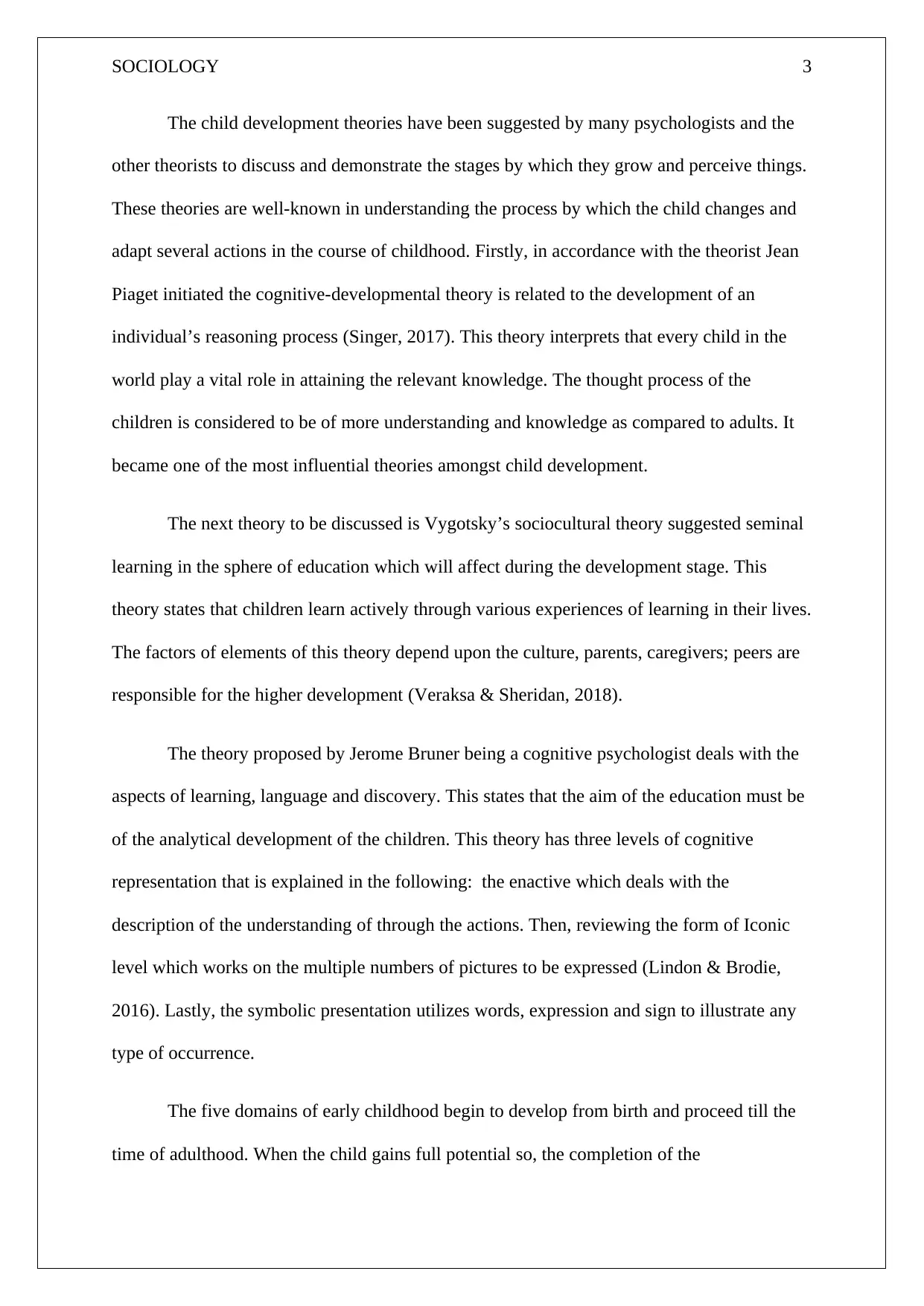
SOCIOLOGY 3
The child development theories have been suggested by many psychologists and the
other theorists to discuss and demonstrate the stages by which they grow and perceive things.
These theories are well-known in understanding the process by which the child changes and
adapt several actions in the course of childhood. Firstly, in accordance with the theorist Jean
Piaget initiated the cognitive-developmental theory is related to the development of an
individual’s reasoning process (Singer, 2017). This theory interprets that every child in the
world play a vital role in attaining the relevant knowledge. The thought process of the
children is considered to be of more understanding and knowledge as compared to adults. It
became one of the most influential theories amongst child development.
The next theory to be discussed is Vygotsky’s sociocultural theory suggested seminal
learning in the sphere of education which will affect during the development stage. This
theory states that children learn actively through various experiences of learning in their lives.
The factors of elements of this theory depend upon the culture, parents, caregivers; peers are
responsible for the higher development (Veraksa & Sheridan, 2018).
The theory proposed by Jerome Bruner being a cognitive psychologist deals with the
aspects of learning, language and discovery. This states that the aim of the education must be
of the analytical development of the children. This theory has three levels of cognitive
representation that is explained in the following: the enactive which deals with the
description of the understanding of through the actions. Then, reviewing the form of Iconic
level which works on the multiple numbers of pictures to be expressed (Lindon & Brodie,
2016). Lastly, the symbolic presentation utilizes words, expression and sign to illustrate any
type of occurrence.
The five domains of early childhood begin to develop from birth and proceed till the
time of adulthood. When the child gains full potential so, the completion of the
The child development theories have been suggested by many psychologists and the
other theorists to discuss and demonstrate the stages by which they grow and perceive things.
These theories are well-known in understanding the process by which the child changes and
adapt several actions in the course of childhood. Firstly, in accordance with the theorist Jean
Piaget initiated the cognitive-developmental theory is related to the development of an
individual’s reasoning process (Singer, 2017). This theory interprets that every child in the
world play a vital role in attaining the relevant knowledge. The thought process of the
children is considered to be of more understanding and knowledge as compared to adults. It
became one of the most influential theories amongst child development.
The next theory to be discussed is Vygotsky’s sociocultural theory suggested seminal
learning in the sphere of education which will affect during the development stage. This
theory states that children learn actively through various experiences of learning in their lives.
The factors of elements of this theory depend upon the culture, parents, caregivers; peers are
responsible for the higher development (Veraksa & Sheridan, 2018).
The theory proposed by Jerome Bruner being a cognitive psychologist deals with the
aspects of learning, language and discovery. This states that the aim of the education must be
of the analytical development of the children. This theory has three levels of cognitive
representation that is explained in the following: the enactive which deals with the
description of the understanding of through the actions. Then, reviewing the form of Iconic
level which works on the multiple numbers of pictures to be expressed (Lindon & Brodie,
2016). Lastly, the symbolic presentation utilizes words, expression and sign to illustrate any
type of occurrence.
The five domains of early childhood begin to develop from birth and proceed till the
time of adulthood. When the child gains full potential so, the completion of the
Secure Best Marks with AI Grader
Need help grading? Try our AI Grader for instant feedback on your assignments.
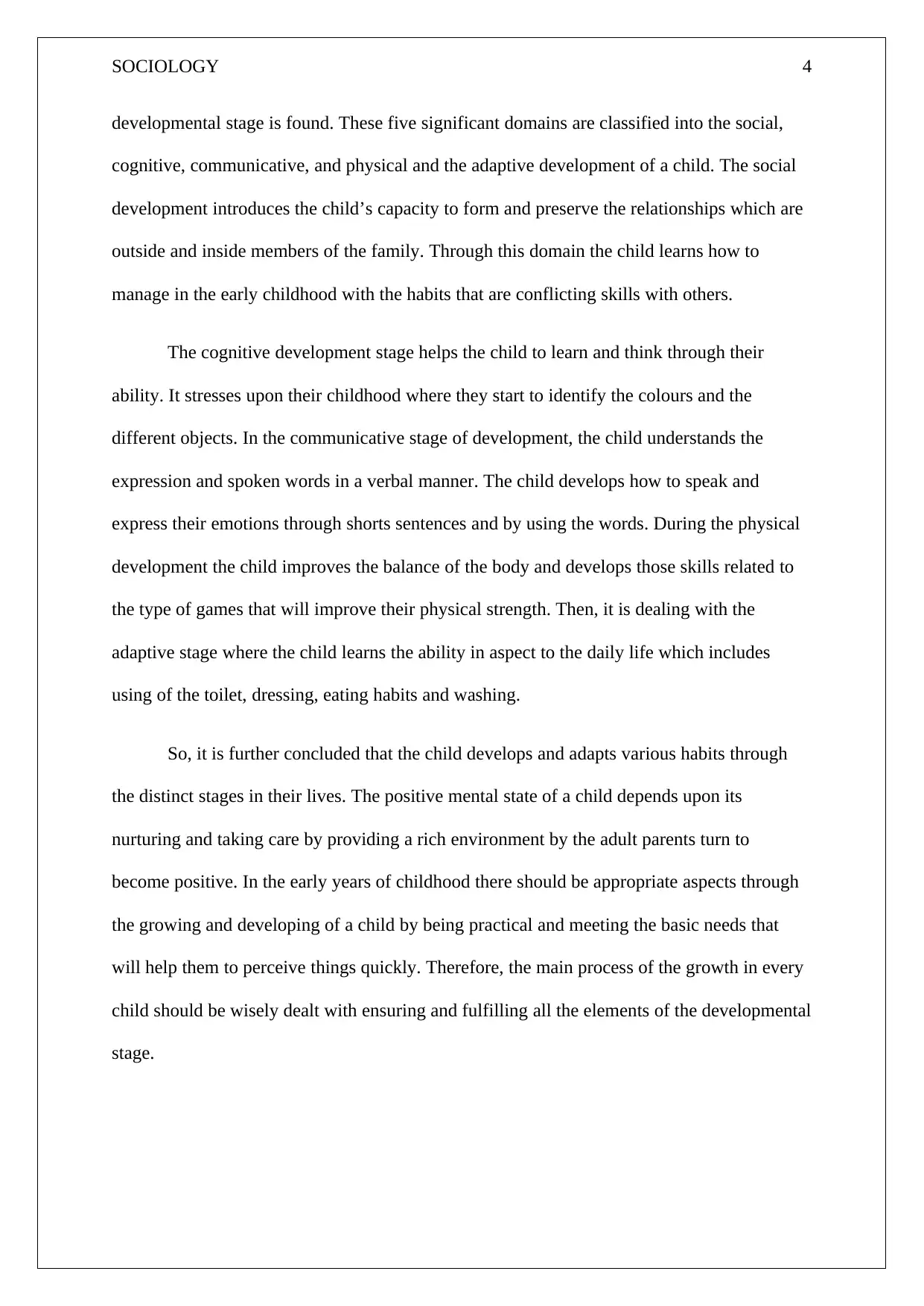
SOCIOLOGY 4
developmental stage is found. These five significant domains are classified into the social,
cognitive, communicative, and physical and the adaptive development of a child. The social
development introduces the child’s capacity to form and preserve the relationships which are
outside and inside members of the family. Through this domain the child learns how to
manage in the early childhood with the habits that are conflicting skills with others.
The cognitive development stage helps the child to learn and think through their
ability. It stresses upon their childhood where they start to identify the colours and the
different objects. In the communicative stage of development, the child understands the
expression and spoken words in a verbal manner. The child develops how to speak and
express their emotions through shorts sentences and by using the words. During the physical
development the child improves the balance of the body and develops those skills related to
the type of games that will improve their physical strength. Then, it is dealing with the
adaptive stage where the child learns the ability in aspect to the daily life which includes
using of the toilet, dressing, eating habits and washing.
So, it is further concluded that the child develops and adapts various habits through
the distinct stages in their lives. The positive mental state of a child depends upon its
nurturing and taking care by providing a rich environment by the adult parents turn to
become positive. In the early years of childhood there should be appropriate aspects through
the growing and developing of a child by being practical and meeting the basic needs that
will help them to perceive things quickly. Therefore, the main process of the growth in every
child should be wisely dealt with ensuring and fulfilling all the elements of the developmental
stage.
developmental stage is found. These five significant domains are classified into the social,
cognitive, communicative, and physical and the adaptive development of a child. The social
development introduces the child’s capacity to form and preserve the relationships which are
outside and inside members of the family. Through this domain the child learns how to
manage in the early childhood with the habits that are conflicting skills with others.
The cognitive development stage helps the child to learn and think through their
ability. It stresses upon their childhood where they start to identify the colours and the
different objects. In the communicative stage of development, the child understands the
expression and spoken words in a verbal manner. The child develops how to speak and
express their emotions through shorts sentences and by using the words. During the physical
development the child improves the balance of the body and develops those skills related to
the type of games that will improve their physical strength. Then, it is dealing with the
adaptive stage where the child learns the ability in aspect to the daily life which includes
using of the toilet, dressing, eating habits and washing.
So, it is further concluded that the child develops and adapts various habits through
the distinct stages in their lives. The positive mental state of a child depends upon its
nurturing and taking care by providing a rich environment by the adult parents turn to
become positive. In the early years of childhood there should be appropriate aspects through
the growing and developing of a child by being practical and meeting the basic needs that
will help them to perceive things quickly. Therefore, the main process of the growth in every
child should be wisely dealt with ensuring and fulfilling all the elements of the developmental
stage.
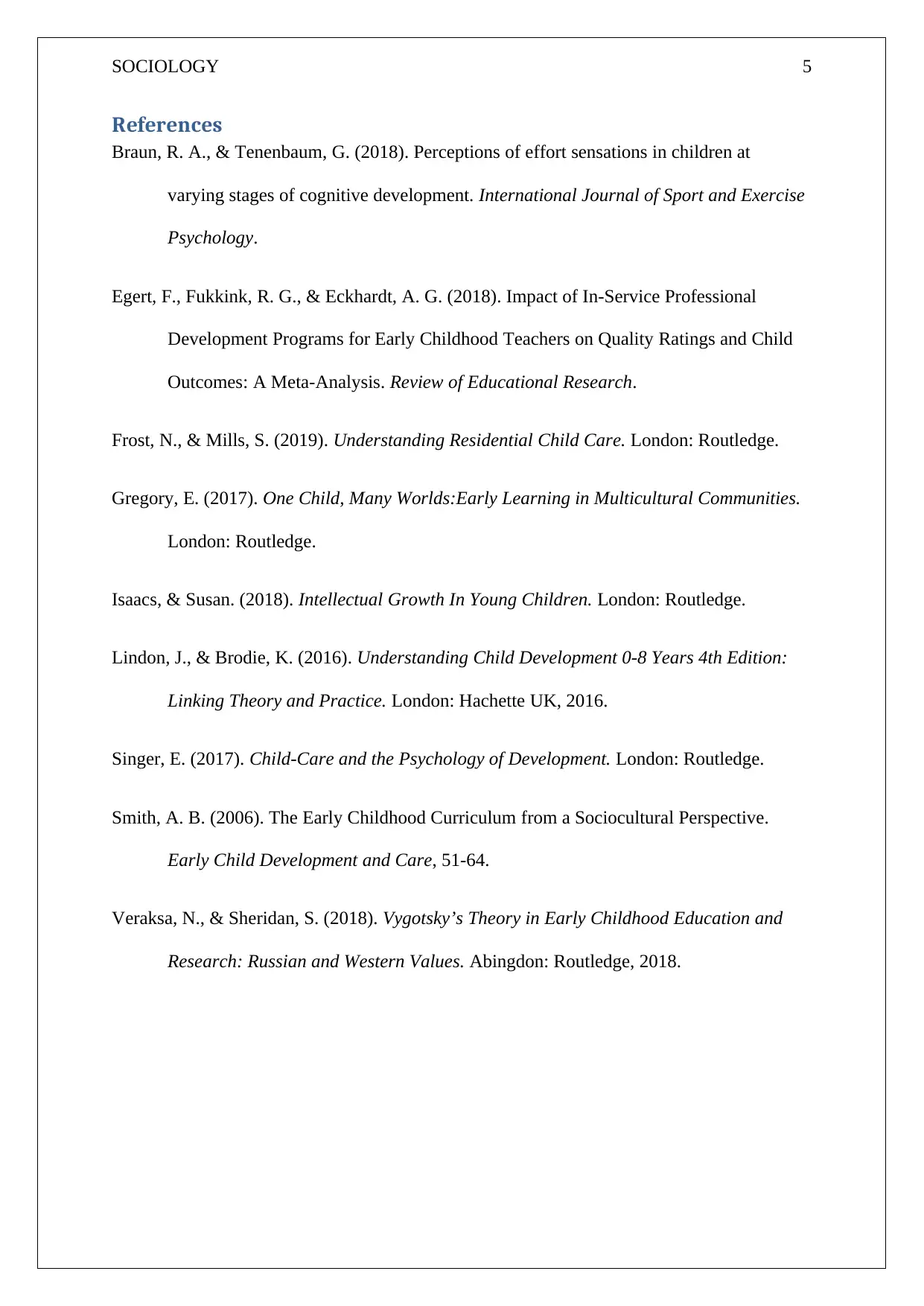
SOCIOLOGY 5
References
Braun, R. A., & Tenenbaum, G. (2018). Perceptions of effort sensations in children at
varying stages of cognitive development. International Journal of Sport and Exercise
Psychology.
Egert, F., Fukkink, R. G., & Eckhardt, A. G. (2018). Impact of In-Service Professional
Development Programs for Early Childhood Teachers on Quality Ratings and Child
Outcomes: A Meta-Analysis. Review of Educational Research.
Frost, N., & Mills, S. (2019). Understanding Residential Child Care. London: Routledge.
Gregory, E. (2017). One Child, Many Worlds:Early Learning in Multicultural Communities.
London: Routledge.
Isaacs, & Susan. (2018). Intellectual Growth In Young Children. London: Routledge.
Lindon, J., & Brodie, K. (2016). Understanding Child Development 0-8 Years 4th Edition:
Linking Theory and Practice. London: Hachette UK, 2016.
Singer, E. (2017). Child-Care and the Psychology of Development. London: Routledge.
Smith, A. B. (2006). The Early Childhood Curriculum from a Sociocultural Perspective.
Early Child Development and Care, 51-64.
Veraksa, N., & Sheridan, S. (2018). Vygotsky’s Theory in Early Childhood Education and
Research: Russian and Western Values. Abingdon: Routledge, 2018.
References
Braun, R. A., & Tenenbaum, G. (2018). Perceptions of effort sensations in children at
varying stages of cognitive development. International Journal of Sport and Exercise
Psychology.
Egert, F., Fukkink, R. G., & Eckhardt, A. G. (2018). Impact of In-Service Professional
Development Programs for Early Childhood Teachers on Quality Ratings and Child
Outcomes: A Meta-Analysis. Review of Educational Research.
Frost, N., & Mills, S. (2019). Understanding Residential Child Care. London: Routledge.
Gregory, E. (2017). One Child, Many Worlds:Early Learning in Multicultural Communities.
London: Routledge.
Isaacs, & Susan. (2018). Intellectual Growth In Young Children. London: Routledge.
Lindon, J., & Brodie, K. (2016). Understanding Child Development 0-8 Years 4th Edition:
Linking Theory and Practice. London: Hachette UK, 2016.
Singer, E. (2017). Child-Care and the Psychology of Development. London: Routledge.
Smith, A. B. (2006). The Early Childhood Curriculum from a Sociocultural Perspective.
Early Child Development and Care, 51-64.
Veraksa, N., & Sheridan, S. (2018). Vygotsky’s Theory in Early Childhood Education and
Research: Russian and Western Values. Abingdon: Routledge, 2018.

SOCIOLOGY 6
1 out of 7
Your All-in-One AI-Powered Toolkit for Academic Success.
+13062052269
info@desklib.com
Available 24*7 on WhatsApp / Email
![[object Object]](/_next/static/media/star-bottom.7253800d.svg)
Unlock your academic potential
© 2024 | Zucol Services PVT LTD | All rights reserved.





